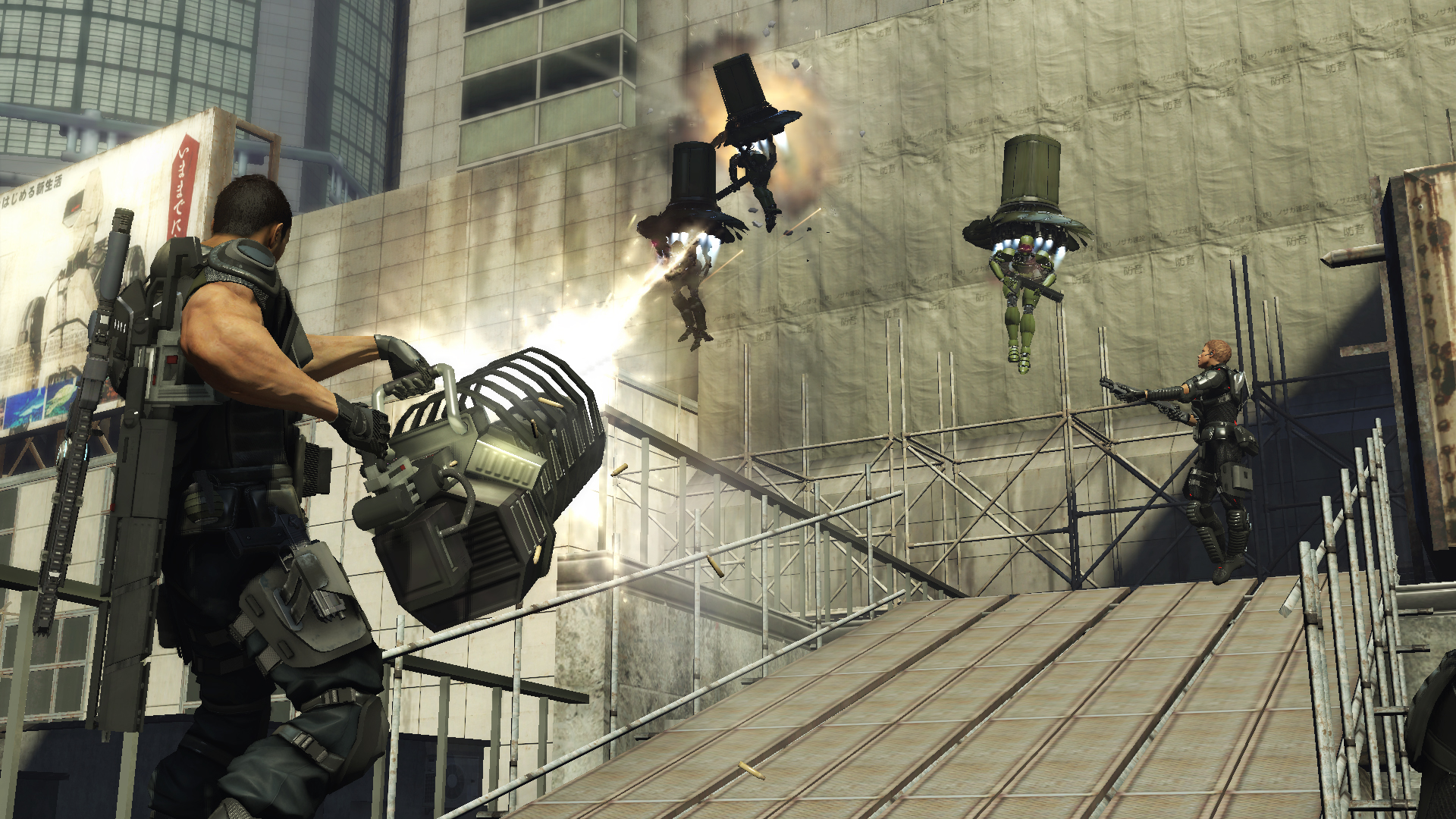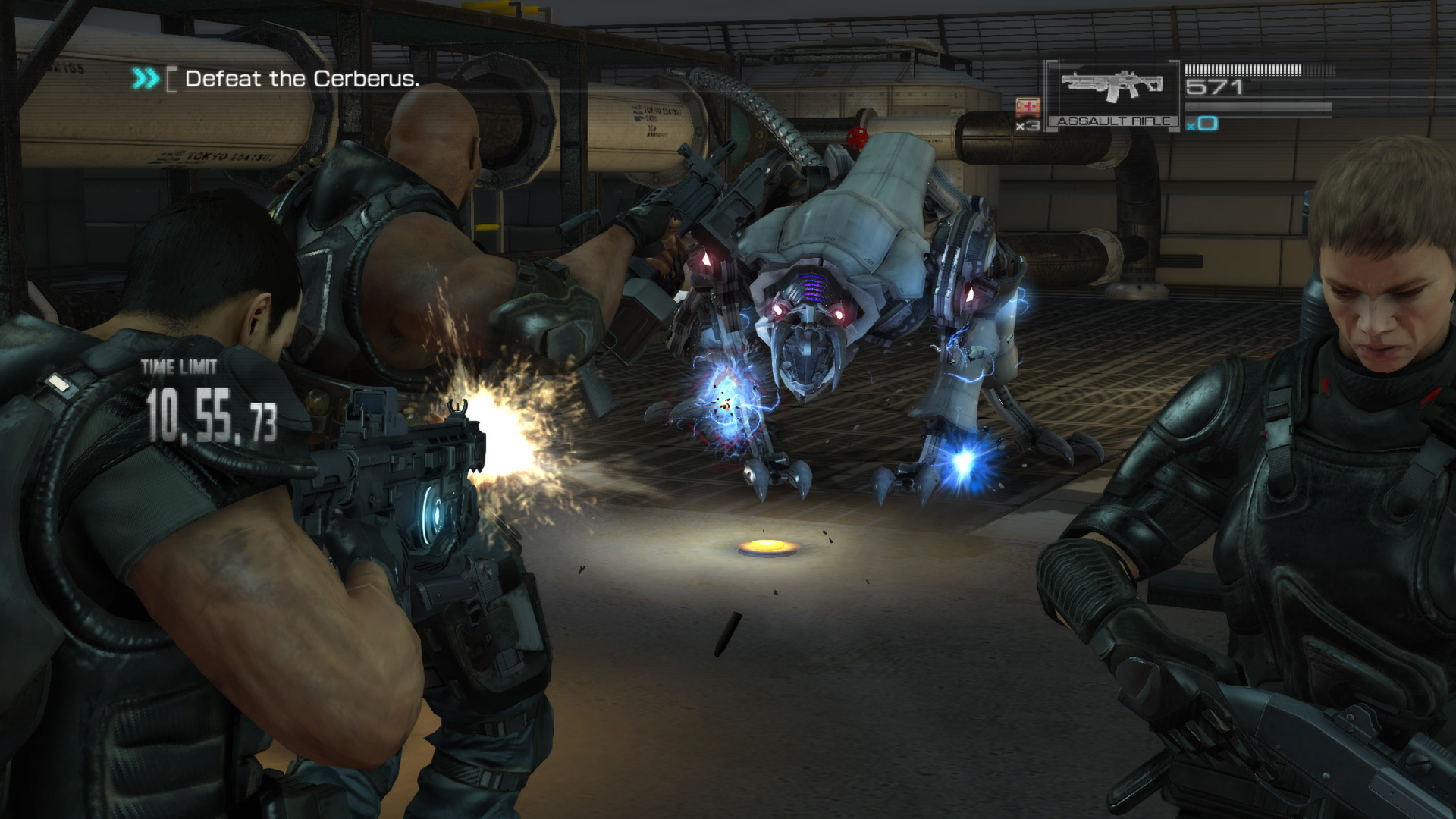Search
[{{{type}}}] {{{reason}}}
{{/data.error.root_cause}}{{{_source.title}}} {{#_source.showPrice}} {{{_source.displayPrice}}} {{/_source.showPrice}}
{{#_source.showLink}} {{/_source.showLink}} {{#_source.showDate}}{{{_source.displayDate}}}
{{/_source.showDate}}{{{_source.description}}}
{{#_source.additionalInfo}}{{#_source.additionalFields}} {{#title}} {{{label}}}: {{{title}}} {{/title}} {{/_source.additionalFields}}
{{/_source.additionalInfo}}Binary Domain (PC)

Binary Domain
Developed By: Ryu Ga Gotoku, Devil's Details
Published By: SEGA
Released: April 27, 2012
Available On: Windows, PS3, Xbox 360
Genre: Third-person shooter
ESRB Rating: M for Mature: Blood and Gore, Intense Violence, Strong Language, Suggestive Themes
Number of Players: 1 player campaign, online multiplayer
Price: $9.99
(Amazon Affiliate Link)
Binary Domain was released in 2012 towards the end of the industry’s cover-based shooter phase. It took that core gameplay and added a branching storyline with consequences and a voice-control gimmick to stand out in a market saturated with cover shooters. Time has shown that this direction, while certainly bold, didn’t execute very well. But I’m getting ahead of myself here.
Binary Domain takes place in a future where robots are now capable enough to act human. They’re all over the place, filling in the labour gap created by billions dying to global warming. Everything is peachy until one man discovers he is actually a robot programmed to think he is human, decades ahead in technology, and a clear violation of a robot equivalent to the Geneva Convention. As a member of an elite military squad, your job is to infiltrate an isolationist Japan and retrieve the one scientist capable of creating such robots. There isn’t much more to the setup than that. Stylistically, it’s a little over-the-top, the way Japanese-developed military action games tend to be; think along the lines of Vanquish or Metal Gear Solid here.
As you play through the story, you’ll also be interacting with your fellow squad mates. They’ll ask you questions, and you’ll respond. Unfortunately it’s really not as deep as the suggested prompts might hint at – all it amounts to ultimately is whether you agree or disagree with your squad mates, which correspondingly increases or decreases their trust in your abilities. Getting squad mates to trust you affects who lives and dies in the end, but ultimately does not affect the overall story. In the abstract, the “Consequence System” doesn’t feel like it’s doing anything meaningful here, but when lowering expectations for an action game, it might be considered moderately robust.

Strong Points: Uniquely robotic enemy
Weak Points: Corridor shooter level design, incompetent squad AI
Moral Warnings: Swearing, destruction of humanoid robots, suicide, sexual language, fade-to-black sex scene
As you’d expect from a cover based shooter, the game is all about corners, doors, and chest high walls. You run from one spot of cover to another, and pop out to take pot shots at enemies. The weapons available in the game are a small but focused selection, and you pick out two squad mates, although the AI barely does anything useful.
But that’s about where it ends for much of Binary Domain’s level design. Almost the entire game is lacking in any interesting combat spaces; it’s just one continuous corridor with very little branching or large spaces for any interesting flanking manoeuvres. Some of the combat spaces seem large and open, but those encounters are still functionally a corridor. Sometimes you have to push forward, sometimes you have to defend, but the enemies are all still going to funnel in through one corridor. Voice commands issued to squad mates boil down to “advance” or “retreat.” The only reprieve from this is the few boss fights and set piece encounters. There are a few other segments that switch it up, with variety including racing through sewers on jetskis, rail shooter segments, and stomping around in a giant mech; it’s almost as if the developers didn’t have enough faith in the core cover-shooter mechanics. To be fair though, modern triple-A shooters are still doing this, so perhaps this is a criticism of the industry rather than on Binary Domain.
The controls are also finicky. Using an Xbox controller is a no-go – the setup tool doesn’t allow rebinding and the in-game is a mess. I ended up using keyboard; the default bindings are a mess and depart heavily from the convention for no good reason. Voice control – the other gimmick in the game to set it apart from the crowd – is extremely finicky. Most of the time the game won’t recognise that you’ve issued a voice command, and when it does, it will probably process it as the wrong command. I did a quick check online for this, and it turns out the voice command was also universally panned. In short, don’t bother with voice, it’s a waste of time and you only need the default prompts anyway.
Perhaps the one saving grace in this game is the enemies. The enemies in this game are all robots. Binary Domain has hulking giant set-piece robots for spectacle fights, small swarms to harass the player, and plenty of robot soldiers. But the most interesting thing is the mundane looking robot soldiers. We’ve seen humanoid enemies before in hundreds of military shooters. What sets these robots apart though is their resilience. They can continue fighting after their limbs are removed. More specifically, they fall over as you’d expect from a dead target – only to crawl around out of sight and ambush when you advance. This is something that I’ve yet to see from any other games with robots. (And if you know of any such game, please do leave a comment.)

Higher is better
(10/10 is perfect)
Game Score - 66%
Gameplay - 12/20
Graphics - 6/10
Sound - 7/10
Stability - 4/5
Controls - 4/5
Morality Score - 58%
Violence - 2/10
Language - 4/10
Sexual Content - 5/10
Occult/Supernatural - 10/10
Cultural/Moral/Ethical - 8/10
The aesthetics aren’t anything special. Broadly, the game takes you through a fairly plain highway and underground, then into a brightly lit upper city that hints of a dystopia. The visuals are what you’d expect for a game released in 2012. You’ll become very familiar with the sound of bullets pinging against metal and the soundtrack is nothing memorable.
Binary Domain has violence aplenty, as should be expected from a game with a military thematic. It’s technically (almost) all aimed at robots, but as mentioned in the story synopsis, some of these robots are programmed to think they’re human. While these specific robots are never the target of the player’s violence, they still appear and act very much human. One of these is beaten up by a lynch mob. It should be noted that in the final boss fight, you must face off against humans in mechs, one of whom will suicide with a gun to the head. These scenes are all very graphic in their depictions.
Characters will dish out a liberal dose of swearing. There are no F-bombs in here, but there is certainly a lot of s***. Early on the the squad will pass through a red-light district in the slums; it's a small area and interactions are minimal, but you have your street prostitutes and pole dancers as you'd expect. Halfway through the game, the player can also sweet talk one of the squad mates into bed, although it’s just a fade to black. You work with a criminal gang to get around quietly. The entire story premise is a subversion of the Japanese government, although it’s implied they’ve been reduced to being a corporate puppet and are hostile to the international community, so this might be considered in a similar light to acting against a terrorist government.
I played Binary Domain because I had heard of the unique resilience of the robot soldiers from a thread about interesting video game gimmicks. It delivered on that gimmick, and not much else. In the end, I felt like I was really watching a movie while being shepherded along through snippets of interaction. While I enjoyed my run with the robots, I can’t recommend this game beyond that enemy gimmick. If you’re still on the fence about it though, I would instead recommend the movie Vexille. It’s not related to Binary Domain, and it’s a very different story, but it’ll cover most of the same themes in less time and be a lot more entertaining with a similar-enough style of storytelling.






